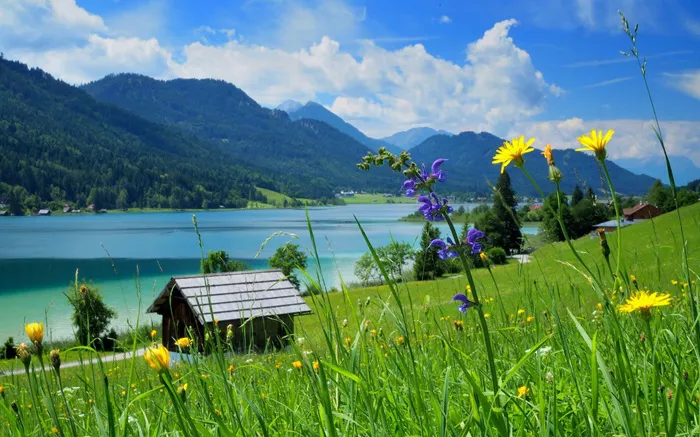Welcome to Poem of the Day – Der Sommer by Gotthold Ephraim Lessing.
The German Enlightenment writer Gotthold Ephraim Lessing is widely known for his contributions to philosophy, drama, and poetry. One of his lesser-known poems, Der Sommer (“The Summer”), captures the essence of nature’s beauty and the transience of life. In this article, we will explore the poem’s meaning, structure, and themes. We will break down the poem line by line, offering a clear and logical explanation of Lessing’s use of imagery, symbolism, and tone.
Der Sommer Poem
_Brueder! lobt die Sommerszeit!_
Ja, dich, Sommer, will ich loben!
Wer nur deine Munterkeit,
Deine bunte Pracht erhoben,
Dem ist wahrlich, dem ist nur,
Nur dein halbes Lob gelungen,
Haett er auch, wie Brocks, gesungen,
Brocks, der Liebling der Natur.
Hoer ein groesser Lob von mir,
Sommer! ohne stolz zu werden.
Brennst du mich, so dank ichs dir,
Dass ich bei des Strahls Beschwerden,
Bei der durstgen Mattigkeit,
Lechzend nach dem Weine frage,
Und gekuehlt den Bruedern sage:
_Brueder! lobt die durstge Zeit!_
Der Sommer Explanation
About Gotthold Ephraim Lessing
Gotthold Ephraim Lessing (1729–1781) was one of the most important figures of the German Enlightenment. He is best known for his works in drama, especially Nathan the Wise, and for his contributions to literary criticism. Lessing’s poetry, like much of his other work, reflects a blend of reason, humanism, and an appreciation of nature.
Overview of the Poem
Der Sommer is a short lyric poem that contrasts the vibrancy and warmth of summer with the inevitable passing of time. Lessing uses nature as a metaphor for human life, exploring themes of growth, decay, and the cyclical nature of existence. The poem also reflects the Enlightenment ideals of observing and understanding the natural world in a rational and reflective manner.
Analysis of the Poem
The poem is structured in clear, simple lines that convey the gradual shift of summer from its peak to its decline. The language is direct, with each stanza contributing to the overall tone of melancholy mixed with appreciation for the present.
Stanza 1: The Joys of Summer
In the first stanza, Lessing opens by describing the lush beauty of summer. He speaks of the sun shining brightly, the flowers blooming, and the warmth that brings life to all living things. These images of summer evoke a sense of joy, vitality, and abundance. The sensory details paint a picture of an idyllic season, filled with life and energy.
Example:
“Die Wiesen blüh’n, die Bäume grünen,”
(“The meadows bloom, the trees are green”)
This line emphasizes the vibrancy of summer, where nature is at its fullest expression. The poet uses simple, vivid images to portray a perfect, flourishing world.
Stanza 2: The Passing of Time
In the second stanza, Lessing begins to introduce the idea of time’s passage. The beauty of summer is fleeting, and the poet acknowledges that this vibrant period will eventually come to an end. The flowers will fade, and the warmth of the sun will recede. Here, Lessing reflects on the inevitability of change.
Example:
“Der Wind verweht die Blüten, und der Regen fällt.”
(“The wind blows away the blossoms, and the rain falls.”)
The wind and rain symbolize forces beyond our control. They remind us that all things, no matter how beautiful, must eventually fade. This idea of transience is a central theme in the poem.
Stanza 3: The Reflection on Mortality
The final stanza takes a more introspective turn. Lessing compares the cycle of nature to human life. Just as summer comes to an end, so too do the stages of life. The poet meditates on the fact that all moments of happiness and vitality are temporary, urging the reader to appreciate the present while it lasts.
Example:
“Und der Herbst, der bald das Land erreicht.”
(“And autumn, which will soon reach the land.”)
Autumn here is symbolic of the later stages of life. The coming of autumn signals a time of change, a time when the peak of vitality has passed. The reference to autumn suggests a sense of inevitability, as well as a reminder of life’s impermanence.
Themes in Der Sommer
The Cyclical Nature of Life and Nature
Lessing uses summer as a metaphor for the stages of human life. Just as summer leads into autumn, youth gives way to old age. This theme reflects the Enlightenment belief in understanding life through the observation of nature.
Transience and Impermanence
The poet emphasizes that all things, no matter how beautiful, are temporary. This evokes a sense of urgency to appreciate the present moment before it slips away.
The Beauty of the Present
Despite the poem’s reflections on the passing of time, there is also an appreciation for the beauty of summer and life itself. Lessing urges readers to enjoy life while it is in full bloom.
The Power of Nature
The poem illustrates nature’s influence over human life, not just in terms of beauty but also in its inevitability. Nature’s cycles remind us that our lives, too, are part of a larger pattern of change and renewal.
Conclusion
Der Sommer by Gotthold Ephraim Lessing is a thoughtful meditation on the beauty and transience of life. Through simple yet powerful imagery, the poet captures the fleeting nature of summer and, by extension, the stages of human existence. The poem serves as a reminder to cherish the present and reflect on the passing of time. Lessing’s work invites readers to pause and appreciate life’s moments before they are swept away by the inevitable winds of change.

